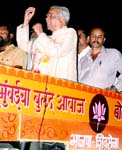Commentary/Mani Shankar Aiyar
The Hindus of Hamstead Heath
And as for imported traditions, I would wish to feel as at home
with them here in India as Swapan and I are with Hampstead traditions
in a Hampstead pub. Doubtless, Swapan would attack his steak-and-kidney
pie -- or at any rate his roast lamb -- with a fork and knife,
taking special care not to eat his peas with a knife, instead
of committing the outrage of attacking his pub lunch in the manner
in which his fingers at home do violence to a dead hilsa. On the
other hand, the bhadralok would simply excommunicate Swapan if
he were to take a fork to a hilsa -- that is, if he didn't choke
on the bones of the hilsa first!
 Swapan's third question is: 'Is secularism a badge of commitment
or an employment opportunity?' Well, going by the number
of former accountant-generals and superannuated chief secretaries
the BJP has taken on, I would guess Hindu fundamentalism is a
post-retirement employment opportunity; and that the Shyama Prasad
Mukherjee Foundation is not a bad perch for those who flunked
the IAS exam.
Swapan's third question is: 'Is secularism a badge of commitment
or an employment opportunity?' Well, going by the number
of former accountant-generals and superannuated chief secretaries
the BJP has taken on, I would guess Hindu fundamentalism is a
post-retirement employment opportunity; and that the Shyama Prasad
Mukherjee Foundation is not a bad perch for those who flunked
the IAS exam.
The secularist NGO collecting his wad from the welfare
ministry can at least comfort himself with the thought that his
loot has come from an indigenous tax-payer, not some Hampstead
crorepati whose corner of some foreign heath is forever Hindu.
Let us then take Swapan's next problem. 'Is there,' he asks, 'a
link between anti-Hindutva and upward social mobility?' Oh, yes, there is a link between anti-Hindutva and upward moral mobility; possibly even between anti-Hindutva
and upward social sensibility. But given the saffron chic that
is overtaking our establishment, as radical chic overtook the
West in the sixties and seventies, I would imagine that good,
old-fashioned secularism, at, say, St Stephen's is passe compared
to the neo-liberalism of Swapan's Young Fogie Right.
All the preceding questions are, however, by the way, more designed
to show what, a clever boy is young Swapan than to raise the
res. Which lies in Swapan Dasgupta's last rhetorical question:
'Is there a correspondence between those who despise Hindu nationalism
and those who see India as an ethnic menagerie?' In a word, the
answer to that is: 'Yes! What is narrow minded and wrong headed
about Hindu nationalism is that it reduces the glorious diversity
of India into the dull uniformity of its majority religion's alleged
cultural profile.
The very expression Swapan uses - 'ethnic menagerie'
- shows the contempt in which he holds the 15 per cent segment
of Indians who, by definition, are excluded from embracing Hindutva.
It is really this distinction between those, like me, who are
100 per cent Indian and those, like Swapan, who are at best 85
per cent Indian, that lies at the root of the argument over whether
the Hindutva weltanschauung (world view) is the right one for India
or the secularist view.
Swapan sees this. Unlike many less intelligent of his cohorts
in the Sangh Parivar, Swapan understands that Hindu nationalism
is an alternative vision of the nature of India's nationhood.
It is. That is why it must be fought tooth-and-nail. And victory
will go not to the party which co-opts the money bags of Hampstead
Heath but to those who mirror the Indian and, therefore, necessarily,
the Hindu view of India.
Pamphleteers of Swapan's persuasion believe that the Hindu in
modern India sees Indian nationalism as coterminus with Hindu
nationalism. The Hindu, they believe, is confused at the suggestion
that there might be other strands too to the nation's identity.
Yet, ever since 1952, when Indians first went to the polls on the
basis of adult franchise and returned only two Jan Sanghis to
the first Lok Sabha, the propagandists of the saffron brigade
have failed to explain why Hindu nationalism has held such little
appeal to the Hindu majority. The answer, of course, lies in one
of the most of-repeated obiter dicta of the Sangh Parivar, that
India is a secular country because Hinduism is a secular religion.
 Precisely, that is precisely why the majority of Hindus rejects
the view that India is exclusively - or even primarily - for its
Hindus; or that the nationhood of modern India should be based
on a reading of the past which declares as apostate one thousand
years of Indian history. It is the ordinary, non-English-speaking
Resident Indian who sees this most clearly.
Precisely, that is precisely why the majority of Hindus rejects
the view that India is exclusively - or even primarily - for its
Hindus; or that the nationhood of modern India should be based
on a reading of the past which declares as apostate one thousand
years of Indian history. It is the ordinary, non-English-speaking
Resident Indian who sees this most clearly.
Whatever the provocations
of the NRI-funded Sangh Parivar, the Indian who has chosen India
in preference to Hampstead as his pitribhoomi and his punyabhoomi wants to see India belonging to all its inhabitants, who do in
fact, constitute an 'ethnic menagerie', even if there are less
pejorative descriptions possible of our unity in diversity.
The forces of Hindutva do not understand this because their version
of Hinduism is a semiticised Hinduism, an alien graft on to our
indigenous tolerance and native sense of fairplay, Swapan seems
to think he is on the winning side because the Hindi-speaking
Hindu of Hinduism is now being liberated from the thrall of angrezi/mlechcha
secularism.
What he does not understand is that westernised secularists
like me are only articulating in a non-Indian tongue that spirit
of goodwill and brotherhood for all which we have learned from our
own people, our own parents, our own culture and our own traditions.
And when Swapan wants his Parivarists to insist on a mandatory
translation of essays like this into an Indian language' so that
the Parivar can then 'wait gleefully for the inevitable backlash,'
he does not seem to know that columns like this one are going
to be translated and published - as, for years, past - into Hindi,
Urdu and Punjabi.
If that has not brought the house down upon
me it is only because I am retailing to the reader of the vernacular
what he already instinctively knows; it is when I write in English
that I find myself dialoguing with the only Hindu who still needs
to be persuaded - the Hindu of Hampstead Heath.
|





 Swapan's third question is: 'Is secularism a badge of commitment
or an employment opportunity?' Well, going by the number
of former accountant-generals and superannuated chief secretaries
the BJP has taken on, I would guess Hindu fundamentalism is a
post-retirement employment opportunity; and that the Shyama Prasad
Mukherjee Foundation is not a bad perch for those who flunked
the IAS exam.
Swapan's third question is: 'Is secularism a badge of commitment
or an employment opportunity?' Well, going by the number
of former accountant-generals and superannuated chief secretaries
the BJP has taken on, I would guess Hindu fundamentalism is a
post-retirement employment opportunity; and that the Shyama Prasad
Mukherjee Foundation is not a bad perch for those who flunked
the IAS exam.
 Precisely, that is precisely why the majority of Hindus rejects
the view that India is exclusively - or even primarily - for its
Hindus; or that the nationhood of modern India should be based
on a reading of the past which declares as apostate one thousand
years of Indian history. It is the ordinary, non-English-speaking
Resident Indian who sees this most clearly.
Precisely, that is precisely why the majority of Hindus rejects
the view that India is exclusively - or even primarily - for its
Hindus; or that the nationhood of modern India should be based
on a reading of the past which declares as apostate one thousand
years of Indian history. It is the ordinary, non-English-speaking
Resident Indian who sees this most clearly.